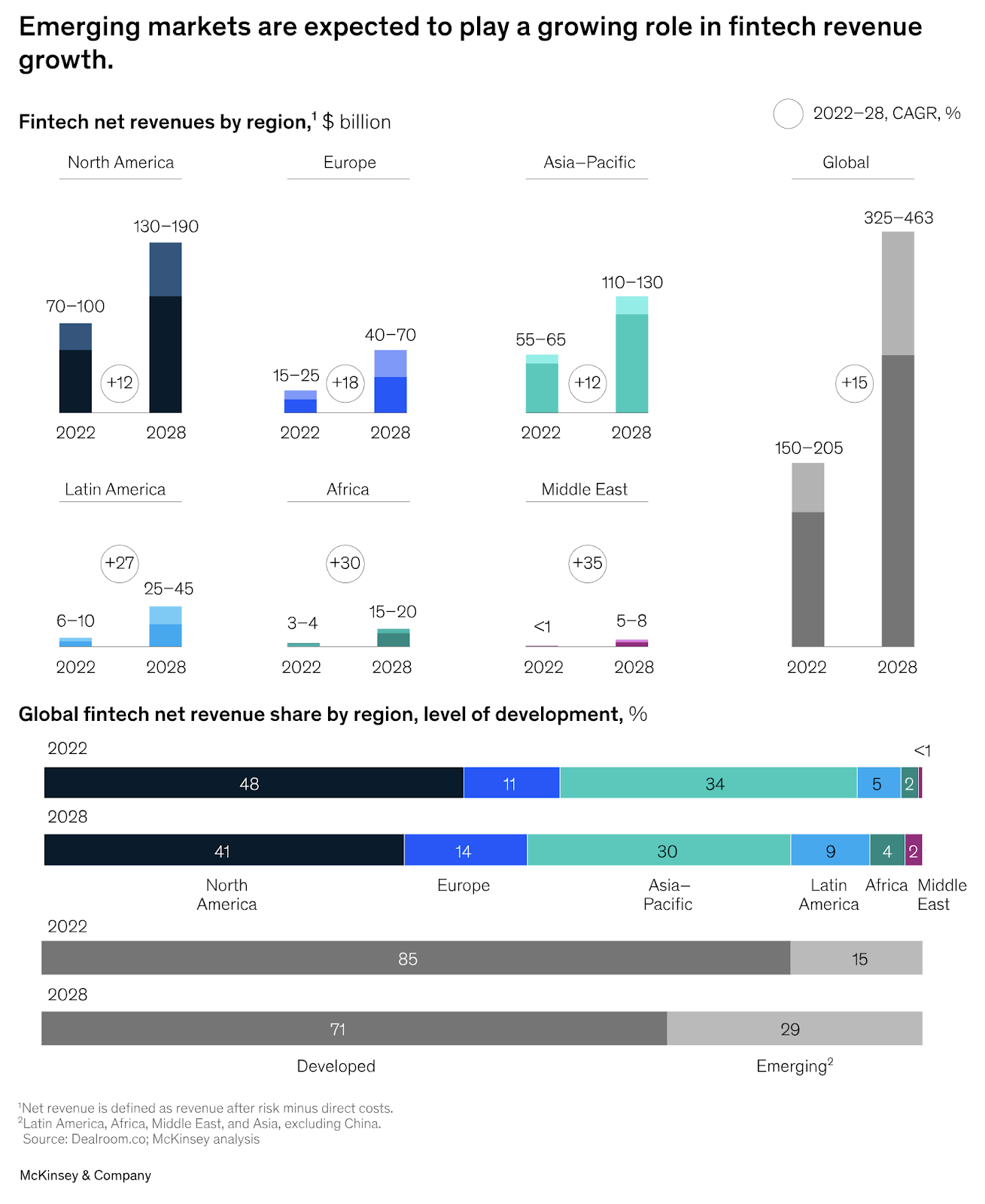Fintech
How technology is reshaping the financial services landscape

Fintech has been driving change in financial services for more than a decade, attracting multi-billion-dollar investments along the way. Recent quarters have seen a slowdown in the rate of deal closures, but fintech innovation remains a very powerful economic driver across the global economy.
Finding the right concentration
Source: Pulse of Fintech, KPMG’s semi-annual analysis of global fintech financing
Despite some easing in the pace at which fintech investments are being made, there is no shortage of investor optimism in this space and there is every reason to expect that fintech will continue to help shape the evolution of the financial services sector over the of the current decade and beyond.
In particular, there is now enormous interest in the potential integration of AI and particularly generative AI technologies into financial service offerings at all levels. Meanwhile, the transition to “open banking” and data sharing in the interest of dramatically improving consumer experiences continues to underpin technology-driven evolutions of payment systems, savings apps and lending solutions alternatives.
Continuous impacts
The pace and way in which fintech solutions are integrated into financial services differs across regions and regulatory environments, with consumer demands, security concerns and data protection considerations influencing how they take shape specific markets. But with fintech’s ability to improve everything from payment processing speed to fraud detection standards, and reduce costs while strengthening customer experiences, the scope for impactful innovation in this sector remains wider than ever.
Challenges to overcome
While fintech innovators are generally busy finding ways to offer solutions to problems, the industry as a whole has been hit by some unavoidable headwinds of late. In fact KPMG, in itslet’s look at the fintech landscape looking ahead to 2024, he describes the sector as facing “a storm of global challenges”. These problems have generally been caused by macroeconomic factors such as stubbornly high inflation rates, in many parts of the world, coupled with unnecessary increases in financing costs.
All eyes on artificial intelligence

Source: Artificial Intelligence in Banking: Artificial Intelligence Will Be an Incremental Game Changer by S&P Global
Looking ahead, as inflation generally continues to decline throughout 2024, the environment for investors is expected to improve, with AI-driven technology representing a clear and bright step in the landscape. Indeed, artificial intelligence looks set to make a big contributionthe next wave of fintech developments. Certainly from an investment perspective, the financial services industry is supporting AI in a big wayJuniper research predicting that generative AI investments among banks will be worth $85 billion globally by 2030, up from $6 billion expected to be in those areas in 2024.
For now, the focus of AI investments in financial services is often on easy wins through efficiency gains, but with technology evolving so rapidly, more impactful innovations and changes for entire business models are also very in sight. As Vice President of IDC’s Global Research Group Rick Villars explains: “In 2024, the shift to AI will enter a critical phase everywhere as companies make major new investments with the goal of dramatically reducing the time and costs associated with customer and employee productivity use cases. From there, the focus will shift to investments that increase revenue and business results.”
Enhance inclusion
More broadly, the emergence of fintech at the heart of the global financial services landscape has been one of the most impactful economic, social and technological evolutions of recent decades. Fintech-driven solutions are now taken for granted and are an integral part of how myriad banking-related activities are undertaken on a daily basis around the world.
Coupled with the onset of the Covid-19 pandemic and the dramatic increase in mobile phone use globally over the past decade, fintech innovation is strengthening financial inclusion around the world, particularly in developing countries. development where many millions of people remain without banking services. According to the World Bank, those same forces and technological advances have helped open access to banking services across all demographics in societies around the world.
Emphasis on value creation
The explosion of fintech startups early in the industry’s evolution has helped transform the landscape of the financial services industry and given rise to what experts at McKinsey & Company describe as“hypergrowth”. More recently, the F-Prime fintech index reported, the sector saw the value of the collective market capitalization of publicly traded fintech companies double to $550 billion between 2019 and July 2023. Over the same period, the number of fintech unicorns worth more than $1 billion has exploded from 39 to 272, McKinsey analysis suggests.
Looking ahead, market expectations are that the focus for innovation among fintech companies will focus more on sustainable value creation rather than experimentation or risk-taking. However, there is little doubt among analysts that fintech companies and investors will continue to play an important role in shaping the financial services landscape, with the adoption of digital banking expected to continue to grow rapidly, e-commerce services -expanding commerce and artificial intelligence driving all kinds of progress.
Notably, even as technology-driven companies focus more on sustainable value creation rather than immediate-impact innovation, McKinsey experts estimate that fintech revenues will grow at a rate nearly three times faster than the traditional banking between 2023 and 2028.

Source: Fintech: A New Growth Paradigm by McKinsey & Company
Competition vs collaboration
The history of fintech has often been one of startups responding to consumer demands that more traditional banks have not been able to meet on their own. This dynamic has fueled cycles of innovation and led to dramatic shifts in the financial services landscape, with traditional banks ultimately forced to respond to protect their market share and keep their customers happy where they can.
By 2024, fintech companies will become a key part of the competitive parameters within which all financial services activities take place, with large banks often working alongside startups to update their offering, particularly regardingpayment processand other times compete against them and try to maximize your advantages.
But whether their efforts are geared towards partnering with established players in the banking industry or against them, there remains enormous scope and potential for fintech companies to continue to make waves across the industry and fundamentally influence how people they bank all over the world.
Fintech
US Agencies Request Information on Bank-Fintech Dealings

Federal banking regulators have issued a statement reminding banks of the potential risks associated with third-party arrangements to provide bank deposit products and services.
The agencies support responsible innovation and banks that engage in these arrangements in a safe and fair manner and in compliance with applicable law. While these arrangements may offer benefits, supervisory experience has identified a number of safety and soundness, compliance, and consumer concerns with the management of these arrangements. The statement details potential risks and provides examples of effective risk management practices for these arrangements. Additionally, the statement reminds banks of existing legal requirements, guidance, and related resources and provides insights that the agencies have gained through their oversight. The statement does not establish new supervisory expectations.
Separately, the agencies requested additional information on a broad range of arrangements between banks and fintechs, including for deposit, payment, and lending products and services. The agencies are seeking input on the nature and implications of arrangements between banks and fintechs and effective risk management practices.
The agencies are considering whether to take additional steps to ensure that banks effectively manage the risks associated with these different types of arrangements.
SUBSCRIBE TO THE NEWSLETTER
And get exclusive articles on the stock markets
Fintech
What changes in financial regulation have impacted the development of financial technology?

Exploring the complex landscape of global financial regulation, we gather insights from leading fintech leaders, including CEOs and finance experts. From the game-changing impact of PSD2 to the significant role of GDPR in data security, explore the four key regulatory changes that have reshaped fintech development, answering the question: “What changes in financial regulation have impacted fintech development?”
- PSD2 revolutionizes access to financial technology
- GDPR Improves Fintech Data Privacy
- Regulatory Sandboxes Drive Fintech Innovation
- GDPR Impacts Fintech Data Security
PSD2 revolutionizes access to financial technology
When it comes to regulatory impact on fintech development, nothing comes close to PSD2. This EU regulation has created a new level playing field for market players of all sizes, from fintech startups to established banks. It has had a ripple effect on other markets around the world, inspiring similar regulatory frameworks and driving global innovation in fintech.
The Payment Services Directive (PSD2), the EU law in force since 2018, has revolutionized the fintech industry by requiring banks to provide third-party payment providers (TPPs) with access to payment services and customer account information via open APIs. This has democratized access to financial data, fostering the development of personalized financial instruments and seamless payment solutions. Advanced security measures such as Strong Customer Authentication (SCA) have increased consumer trust, pushing both fintech companies and traditional banks to innovate and collaborate more effectively, resulting in a dynamic and consumer-friendly financial ecosystem.
The impact of PSD2 has extended beyond the EU, inspiring similar regulations around the world. Countries such as the UK, Australia and Canada have launched their own open banking initiatives, spurred by the benefits seen in the EU. PSD2 has highlighted the benefits of open banking, also prompting US financial institutions and fintech companies to explore similar initiatives voluntarily.
This has led to a global wave of fintech innovation, with financial institutions and fintech companies offering more integrated, personalized and secure services. The EU’s leadership in open banking through PSD2 has set a global standard, promoting regulatory harmonization and fostering an interconnected and innovative global financial ecosystem.
Looking ahead, the EU’s PSD3 proposals and Financial Data Access (FIDA) regulations promise to further advance open banking. PSD3 aims to refine and build on PSD2, with a focus on improving transaction security, fraud prevention, and integration between banks and TPPs. FIDA will expand data sharing beyond payment accounts to include areas such as insurance and investments, paving the way for more comprehensive financial products and services.
These developments are set to further enhance connectivity, efficiency and innovation in financial services, cementing open banking as a key component of the global financial infrastructure.
General Manager, Technology and Product Consultant Fintech, Insurtech, Miquido
GDPR Improves Fintech Data Privacy
Privacy and data protection have been taken to another level by the General Data Protection Regulation (GDPR), forcing fintech companies to tighten their data management. In compliance with the GDPR, organizations must ensure that personal data is processed fairly, transparently, and securely.
This has led to increased innovation in fintech towards technologies such as encryption and anonymization for data protection. GDPR was described as a top priority in the data protection strategies of 92% of US-based companies surveyed by PwC.
Financial Expert, Sterlinx Global
Regulatory Sandboxes Drive Fintech Innovation
Since the UK’s Financial Conduct Authority (FCA) pioneered sandbox regulatory frameworks in 2016 to enable fintech startups to explore new products and services, similar frameworks have been introduced in other countries.
This has reduced the “crippling effect on innovation” caused by a “one size fits all” regulatory approach, which would also require machines to be built to complete regulatory compliance before any testing. Successful applications within sandboxes give regulators the confidence to move forward and address gaps in laws, regulations, or supervisory approaches. This has led to widespread adoption of new technologies and business models and helped channel private sector dynamism, while keeping consumers protected and imposing appropriate regulatory requirements.
Co-founder, UK Linkology
GDPR Impacts Fintech Data Security
A big change in financial regulations that has had a real impact on fintech is the 2018 EU General Data Protection Regulation (GDPR). I have seen how GDPR has pushed us to focus more on user privacy and data security.
GDPR means we have to handle personal data much more carefully. At Leverage, we have had to step up our game to meet these new rules. We have improved our data encryption and started doing regular security audits. It was a little tricky at first, but it has made our systems much more secure.
For example, we’ve added features that give users more control over their data, like simple consent tools and clear privacy notices. These changes have helped us comply with GDPR and made our customers feel more confident in how we handle their information.
I believe that GDPR has made fintech companies, including us at Leverage, more transparent and secure. It has helped build trust with our users, showing them that we take data protection seriously.
CEO & Co-Founder, Leverage Planning
Related Articles
Fintech
M2P Fintech About to Raise $80M

Application Programming Interface (API) Infrastructure Platform M2P Financial Technology has reached the final round to raise $80 million, at a valuation of $900 million.
Specifically, M2P Fintech, formerly known as Yap, is closing a new funding round involving new and existing investors, according to entrackr.com. The India-based company, which last raised funding two and a half years ago, previously secured $56 million in a round led by Insight Partners, earning a post-money valuation of $650 million.
A source indicated that M2P Fintech is ready to raise $80 million in this new funding round, led by a new investor. Existing backers, including Insight Partners, are also expected to participate. The new funding is expected to go toward enhancing the company’s technology infrastructure and driving growth in domestic and international markets.
What does M2P Fintech do?
M2P Fintech’s API platform enables businesses to provide branded financial services through partnerships with fintech companies while maintaining regulatory compliance. In addition to its operations in India, the company is active in Nepal, UAE, Australia, New Zealand, Philippines, Bahrain, Egypt, and many other countries.
Another source revealed that M2P Fintech’s valuation in this funding round is expected to be between USD 880 million and USD 900 million (post-money). The company has reportedly received a term sheet and the deal is expected to be publicly announced soon. The Tiger Global-backed company has acquired six companies to date, including Goals101, Syntizen, and BSG ITSOFT, to enhance its service offerings.
According to TheKredible, Beenext is the company’s largest shareholder with over 13% ownership, while the co-founders collectively own 34% of the company. Although M2P Fintech has yet to release its FY24 financials, it has reported a significant increase in operating revenue. However, this growth has also been accompanied by a substantial increase in losses.
Fintech
Scottish financial technology firm Aveni secures £11m to expand AI offering

By Gloria Methri
Today
- To come
- Aveni Assistance
- Aveni Detection
Artificial intelligence Financial Technology Aveni has announced one of the largest Series A investments in a Scottish company this year, amounting to £11 million. The investment is led by Puma Private Equity with participation from Par Equity, Lloyds Banking Group and Nationwide.
Aveni combines AI expertise with extensive financial services experience to create large language models (LLMs) and AI products designed specifically for the financial services industry. It is trusted by some of the UK’s leading financial services firms. It has seen significant business growth over the past two years through its conformity and productivity solutions, Aveni Detect and Aveni Assist.
This investment will enable Aveni to build on the success of its existing products, further consolidate its presence in the sector and introduce advanced technologies through FinLLM, a large-scale language model specifically for financial services.
FinLLM is being developed in partnership with new investors Lloyds Banking Group and Nationwide. It is a large, industry-aligned language model that aims to set the standard for transparent, responsible and ethical adoption of generative AI in UK financial services.
Following the investment, the team developing the FinLLM will be based at the Edinburgh Futures Institute, in a state-of-the-art facility.
Joseph Twigg, CEO of Aveniexplained, “The financial services industry doesn’t need AI models that can quote Shakespeare; it needs AI models that deliver transparency, trust, and most importantly, fairness. The way to achieve this is to develop small, highly tuned language models, trained on financial services data, and reviewed by financial services experts for specific financial services use cases. Generative AI is the most significant technological evolution of our generation, and we are in the early stages of adoption. This represents a significant opportunity for Aveni and our partners. The goal with FinLLM is to set a new standard for the controlled, responsible, and ethical adoption of generative AI, outperforming all other generic models in our select financial services use cases.”
Previous Article
Network International and Biz2X Sign Partnership for SME Financing
IBSi Daily News Analysis

SMBs Leverage Cloud to Gain Competitive Advantage, Study Shows
IBSi FinTech Magazine

- The Most Trusted FinTech Magazine Since 1991
- Digital monthly issue
- Over 60 pages of research, analysis, interviews, opinions and rankings
- Global coverage
subscribe now
-

 DeFi10 months ago
DeFi10 months agoDeFi Technologies Appoints Andrew Forson to Board of Directors
-

 Fintech10 months ago
Fintech10 months agoUS Agencies Request Information on Bank-Fintech Dealings
-

 News11 months ago
News11 months agoBlock Investors Need More to Assess Crypto Unit’s Earnings Potential, Analysts Say — TradingView News
-

 DeFi10 months ago
DeFi10 months agoSwitchboard Revolutionizes DeFi with New Oracle Aggregator
-

 DeFi10 months ago
DeFi10 months agoIs Zypto Wallet a Reliable Choice for DeFi Users?
-

 News11 months ago
News11 months agoBitcoin and Technology Correlation Collapses Due to Excess Supply
-

 Fintech10 months ago
Fintech10 months agoWhat changes in financial regulation have impacted the development of financial technology?
-

 Fintech10 months ago
Fintech10 months agoScottish financial technology firm Aveni secures £11m to expand AI offering
-

 Fintech10 months ago
Fintech10 months agoScottish financial technology firm Aveni raises £11m to develop custom AI model for financial services
-

 News1 year ago
News1 year agoValueZone launches new tools to maximize earnings during the ongoing crypto summer
-

 Videos4 months ago
Videos4 months ago“Artificial intelligence is bringing us to a future that we may not survive” – Sco to Whitney Webb’s Waorting!
-

 Markets1 year ago
Markets1 year agoCrypto Expert Provides Analysis of Top Altcoins, Market Sees Slight Rise













